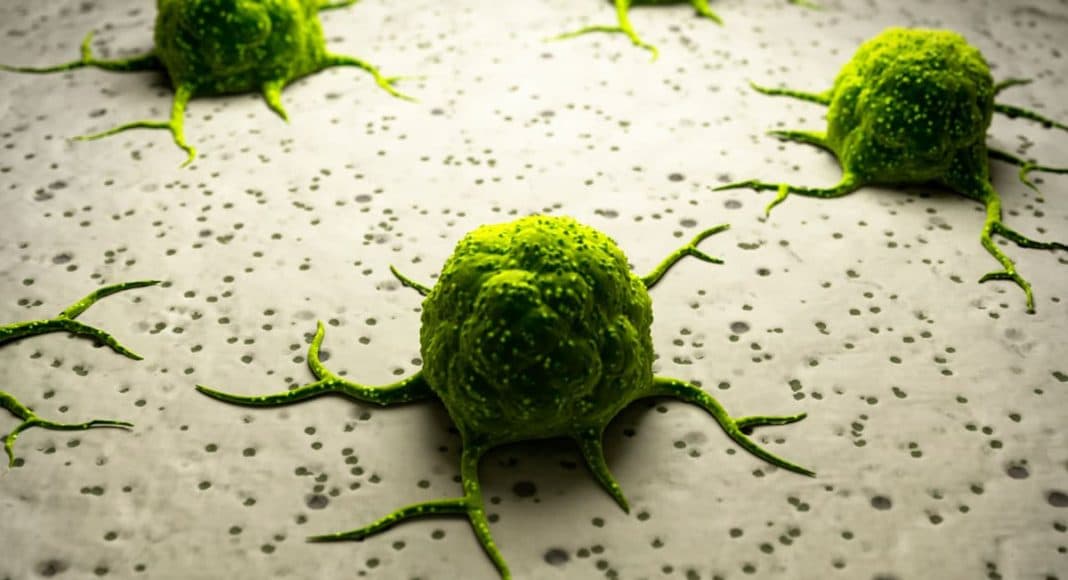Is marijuana good medicine for those suffering from cancer? Definitely. Even the federal government agrees that “cannabinoids may have benefits in the treatment of cancer-related side effects.” Can marijuana cure cancer? That answer remains elusive, but there are no clinical studies demonstrating that marijuana will remove cancerous tumors from the body.
CURE Pharmaceutical, a California-based technology company, revealed last month that it will be conducting a groundbreaking clinical study to test whether cannabis can kill or reduce cancerous cells.
-
Related Story: Study: Marijuana May Treat Aggressive Brain Cancer
The company is partnering with Technion – Israel Institute of Technology, to research whether cannabinoid molecules will attack tumorous cancer cells.
According to Rob Davidson, CURE’s CEO, wants to get beyond treatment and see if there is actually a cure.
“There is strong anecdotal evidence, but we want to put some science into it. First, we’ll do an in vitro study and see the effects on cancer cells. We can get into human trials pretty quickly in Israel,” Davidson said.
About one in four Americans will be diagnosed with cancer sometime in their lives, according to the National Cancer Institute. Nearly every single American has a family member, close friend or coworker who has battled the disease. Last year, an estimated 1,685,210 new cases of cancer were diagnosed in the U.S. and nearly 600,oo0 died from the disease.
Research clearly demonstrates that cannabis is an excellent medicine for alleviating cancer symptoms, but the U.S. government still classifies the herb as a Schedule I drug — meaning it has a high potential for abuse and no known medical use. This oxymoronic stance stifles research on cannabis as a potential cure for cancer.
Despite the regulatory handcuffs the government places on research, there is anecdotal stories about patients who have eliminated cancer using high-THC cannabis oil. But reputable doctors will steer clear of the term “cure.”
-
Related Story: How Marijuana’s CBD Works In The Body According To Science
A more accurate statement would be that it had clearly been demonstrated that cannabis has the potential to fight cancers and tumors.
“I think the day will come when it or some cannabinoid derivatives will be demonstrated to have cancer curative powers, but in the meantime, we must be very cautious about what we promise these patients,” said Dr. Lester Grinspoon, Associate Professor Emeritus of Psychiatry at Harvard Medical School and an authority on medicinal marijuana,
This is where CURE Pharmaceutical comes in. According to the company’s announcement:
CURE has developed a pharmaceutical cannabinoid division to research and develop clinically ready cannabinoid drug formulations and delivery systems for both human and/or animal patients and is developing a global footprint with partners in the U.S., Canada, Israel and Germany, among other markets. The Company has taken a leadership role in optimizing plant base cannabinoids by vertically integrating drug discovery, proprietary extraction technology, genetic-specific cannabinoids research, and drug development.
“We are well-positioned in the pharmaceutical cannabis sector and excited to work within an industry with such a promising future,” said Rob Davidson, CEO of CURE. “Our goal is to bring new cannabinoid molecules to the market through the FDA regulatory process, while utilizing our company’s proprietary delivery technologies to increase efficacy, as well as target unmet needs in traditional pharmaceutical markets that could be disrupted by cannabinoid-based options.”
According To The American Cancer Society:
- A number of small studies of smoked marijuana found that it can be helpful in treating nausea and vomiting from cancer chemotherapy.
- A few studies have found that inhaled (smoked or vaporized) marijuana can be helpful treatment of neuropathic pain (pain caused by damaged nerves).
- Smoked marijuana has also helped improve food intake in HIV patients in studies.
- Studies have long shown that people who took marijuana extracts in clinical trials tended to need less pain medicine.
- More recently, scientists reported that THC and other cannabinoids such as CBD slow growth and/or cause death in certain types of cancer cells growing in lab dishes. Some animal studies also suggest certain cannabinoids may slow growth and reduce spread of some forms of cancer.
- There have been some early clinical trials of cannabinoids in treating cancer in humans and more studies are planned. While the studies so far have shown that cannabinoids can be safe in treating cancer, they do not show that they help control or cure the disease.


